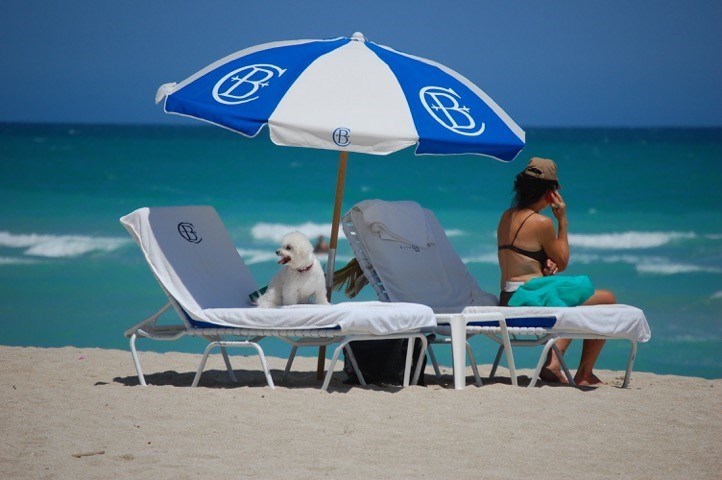Not a travel memoir (the author is a long-time resident) and not a book of history, Craig Pittman’s hilarious new book “Oh, Florida! How America’s Weirdest State Influences the Rest of the Country,” is a madcap whirl through what makes the Sunshine State tick — and what makes its gears grind to a halt. I enjoyed it so much — and found it so helpful for would-be travelers to Florida — that I interviewed the author. Here’s a bit of our conversation:
Pauline Frommer: You spend many hundreds of pages trying to explain why Florida is so weird. If you could sum it up in less than a hundred pages, you probably wouldn’t have written a book. But can you put it in a nutshell?
Craig Pittman: You want the Twittersize answer? Basically, Florida is weird because we have so many people here now — we’re the third most-populous state. We have 20 million people living here, and we also have about 100 million tourists who visit every year. Most of these folks are crammed into a 35-to-40- mile-wide strip around the state’s coast or along the Interstate 4 corridor near Disney. You put that many people in that close proximity to one another — and from so many different backgrounds and cultures and so forth — and they’re bound to start ramming into each other’s cars, attacking each other with machetes, that kind of thing.
Frommer: Then when you mix in alligators and humidity, and the fact that — and I was fascinated when I read this in your book — after World War II, Florida was the second least-populated state in the nation. So this has all happened in a generation and a half.
Pittman: It happened very, very rapidly, and that’s also why things are so weird here. We’ve undergone this wrenching demographic change of going from this extremely rural, extremely undeveloped state to this place where that pecan grove you grew up next to is suddenly a shopping mall, and then the shopping mall is torn down and becomes apartments, and then the apartments get torn down and become a strip shopping center. The pace of change makes it tough to keep up with things. One person I quote in the book says, “If you live in Florida for a while, you’re like that kid in ‘The Sixth Sense’ who’s constantly seeing things that aren’t there anymore.”
Frommer: A lot of the reason people moved there is based on a lie — the idea that Florida is “The Sunshine State” is Orwellian, correct?
Pittman: It’s all hype. Most of our cities get more annual rainfall than famously gloomy Seattle. And, of course, we’re the capital for lightning in the United States as well. And we get hit by more hurricanes than any other state, too.
Frommer: So, a lot is going wrong in Florida. I mean, I don’t want to make this all negative.
Pittman: Definitely not. We have an award-winning state park system. We have some of the most beautiful beaches in the world. We have these cotton-candy sunsets that people rave about. There’s a lot of cool stuff in Florida, too.
Frommer: But you’ve gotta drive to get there. And that’s a problem. Why is the driving so atrocious in Florida?
Pittman: Again, it goes back to that mix of people. We have people who won’t stop for anything, and people who stop for every pebble in the road. We’ve got people who wouldn’t use a turn signal if you threatened to shoot them, and people who turn on their turn signal and leave it on for three miles and then turn in the opposite direction. Plus, the heat makes people’s tempers flare very rapidly, so we end up with some really wild roadrage stories, including my favorite one about the guy in Gainesville who got into a road-rage incident in which he ended up running over himself.
Frommer: How did that happen?
Pittman: He got out of the car. Never get out of the car.
Frommer: Going back to the state parks, people forget that before there was Disney World and all its compatriots among the amusement parks, there were these magical state parks that are well worth visiting today.
Pittman: Absolutely. We go from the highs of Topsail Hill State Park, which has these magnificent 40-foot dunes, to the lows of Devil’s Millhopper State Park, which is a sinkhole that has become its own ecosystem — it actually changes as you go down. We’ve got the Biscayne National Park off the coast; it’s an underwater park.
Frommer: And you’re the only state that has mermaids on the state payroll, right?
Pittman: That’s one of my favorite facts about Florida. There was a roadside attraction, Weeki Wachee Springs, that had women who would dress up as mermaids and swim around and do a show. When they started facing declining fortunes, the state bought the place and took it over. So now the mermaids work for the state, which has led to some interesting conversations about the taxpayers footing the bill for things like waterproof lipstick and shell bras.
Frommer: So if vacationers want to experience the full-out weirdness of Florida, what’s your advice to them?
Pittman: I always tell visitors to park in the shade, lick your fingers before you remove any sand spurs and just enjoy — and be prepared for — the unexpected, because it’s probably going to happen here.
Note to the reader: Please be sure to confirm all rates and details directly with the companies in question before planning your trip. The information in this column was accurate when it was released, but prices are competitive, sometimes limited and can always change without notice.
Pauline Frommer is the Editorial Director for the Frommer Travel Guides and Frommers.com. She co-hosts the radio program The Travel Show with her father, Arthur Frommer and is the author of the best-selling Frommer’s EasyGuide to New York City.
